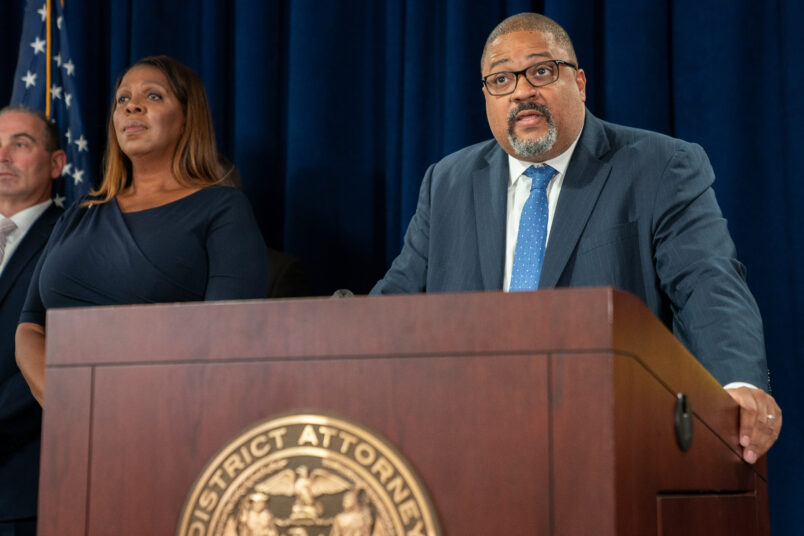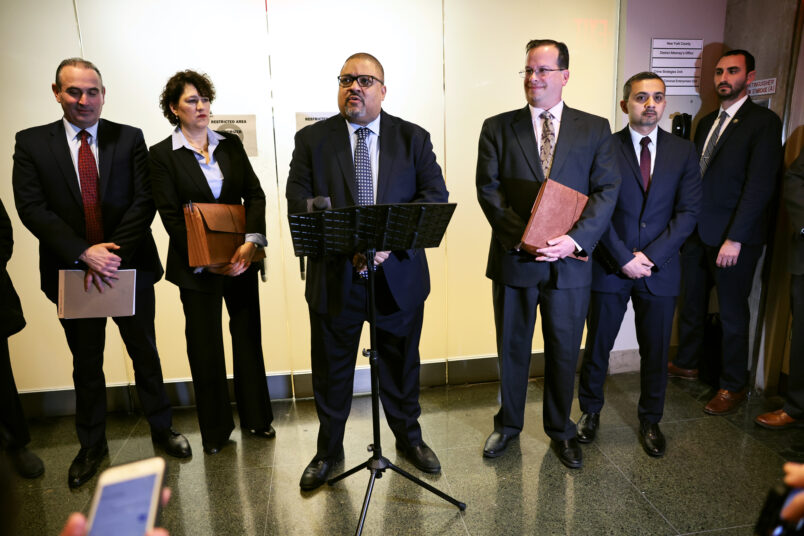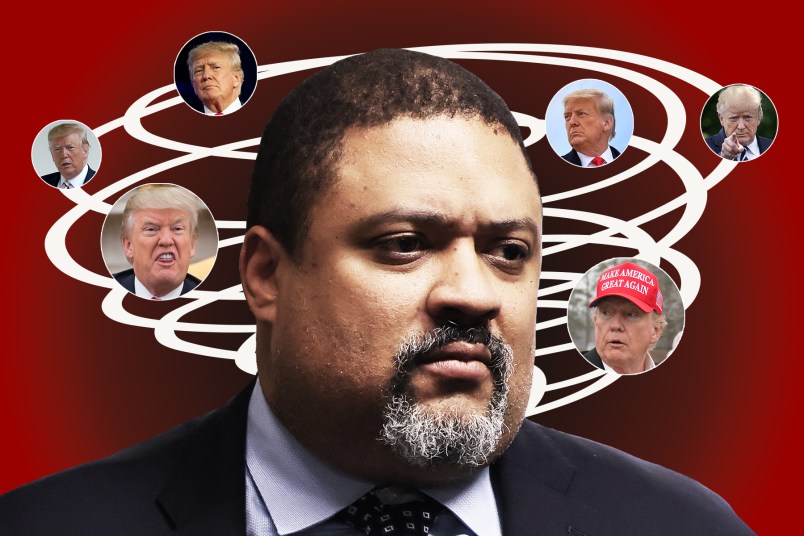Alvin Bragg has spent a long time now in the eye of the storm — or, rather, a series of storms.
A little over a year ago, I asked Bragg, the Manhattan district attorney, a hypothetical question: How would he feel if he found himself being targeted by Donald Trump — perhaps with one of the nicknames or insulting statements the former president uses on his enemies? Bragg suggested he would be unfazed by a trademark attack from Trump.
“I think this happens to people in public life. My job is to stay focused on the mission at hand, which is following the facts and applying the law,” Bragg said.
“I’m not going to say I don’t read the papers and look at stuff,” he continued. “But I think the second that starts affecting what you do is the second you need to do something different.”
I had the chance to speak with Bragg in February 2022. Now, just over a year later, Bragg has found himself in Trump’s crosshairs as his investigation into hush money payments made during the former president’s 2016 campaign has gone before a grand jury.
On March 18 — last Saturday — Trump announced he expected to be arrested in conjunction with the case on Tuesday. That prediction has not come to pass, but, in the days since, Trump has continued attacking Bragg as a media frenzy has swirled around the grand jury proceedings. Trump has used the drama to fuel fundraising appeals where he has blasted Bragg, who is Manhattan’s first Black district attorney, as “rabid,” “racist,” and an “attack dog.” Trump has also stretched the truth to suggest Bragg is “following … orders” from George Soros, a billionaire financier who has long been the focus of anti-Semitic, right-wing conspiracy theories, and whose support for organizations that, in turn, support progressive prosecutors has become a Republican talking point in recent years. Republican politicians in Congress and New York have joined Trump in attacking Bragg, casting him as acting with political motivations.
Bragg inherited investigations into the hush money case and the Trump organization from his predecessor, Cy Vance. And based on my 2022 conversation with Bragg, which has not previously been published, it’s clear the veteran prosecutor expected that Trump could launch an offensive against him if and when those investigations heated up. In general, Bragg is determined to keep his head down and not let politics get in the way of his case work.
“I need to be a bit apart from that because I’ve got to execute and prosecute,” Bragg told me.
Reform Amid A Tabloid Furor
Bragg has spent his entire tenure as district attorney in the eye of the storm. As the local publication City & State put it on Tuesday, Bragg might just be the New York GOP’s “least favorite New York City Democrat.” He became a prime target for local Republicans as soon as he took office. On Jan. 3, 2022, his first day on the job, Bragg issued a “Day One” memo wherein he outlined his commitment to “achieving fairness and safety” through a series of “policy changes” including reducing pretrial incarceration, taking steps to reduce the number of youth in adult court, and directing prosecutors to only charge the most serious crimes.
The memo coincided with a pandemic-era spike in crime that received breathless coverage in New York’s tabloids and national right-wing media. The data portrayed a more complicated picture than the one painted by many of these outlets, which pushed the simple idea the city was returning to the bad old days of the crack epidemic. While major crimes rose sharply, shootings and homicides were down. The uptick in major crimes was not specific to New York— big cities around the country saw a similar increase and, in New York, it did not surpass the crime levels seen in the mid-2000s. Nevertheless, fueled by viral footage, a narrative was taking hold and reform-minded prosecutors — particularly Bragg, with his controversial memo — were given the blame.
My conversation with Bragg was based on this controversy. In our discussion, Bragg suggested that he was somewhat surprised by the firestorm, but also that — in the most high profile of New York City’s five boroughs — it came with the territory.
“I won’t say I expected it specifically, but, more broadly, I clearly get why there’s great interest in this beautiful island,” said Bragg.
Bragg, who ultimately revised the guidelines in the memo, admitted politics was not necessarily his strong suit.
“I’m a career prosecutor. I’m not a politician,” he said, adding, “I’m learning as I go.”
However, the veteran prosecutor, who has spent over two decades working for the U.S. attorney’s office, the state’s attorney general, and as a defense attorney, argued that avoiding the political fray is a desirable trait in a district attorney.
“I think I have to learn the political space in order to navigate it and message our objectives and achieve them, but I also think, you know, the last thing a prosecutor should do is become a politician in the classic sense, right? We’ve got to kind of, by nature of our job, be apart from politics.”
That’s proven to be a difficult tightrope to walk, particularly in the wake of the Black Lives Matter movement, which helped prompt a national conversation around criminal justice reform. Bragg, who grew up in Harlem before attending Harvard Law, and often invokes his experience posting bail for a family member, said he was well aware of this.
“I can’t speak for the whole country, but specifically in Manhattan, people also are very concerned about having that safety delivered in a system that emphasizes fairness and equity and addresses racial disparities,” Bragg said.
Bragg has focused on making gun violence — which has dropped sharply — a priority. While the statistics may show more nuance than the tabloid narratives around crime in New York City, Bragg did not dismiss the fears of those who are worried about rising crime. “The point of the data is you can get it, intellectually, but it’s not going to be where you live viscerally,” he said. There had recently been a shooting on his block, he said, and he was aware of people who had changed “the way they go home” due to feeling increased danger. However, even as Bragg acknowledged fears of rising crime, he also pointed out many New Yorkers simultaneously want both safety and reform.
“I’ve been trying to speak to those realities and trying to build enforcement mechanisms around those realities, while at the same time recognizing the reality that the very same people who are changing the way they’re walking, they also don’t want to be stopped by the police,” Bragg said.

Bragg and Pomerantz
Juggling those paradoxical priorities in a tabloid climate — one that was so intense that some local Democrats eventually blamed it for a spate of congressional losses in last year’s midterms — would be a tough enough assignment for any politician. However, even after he weathered the memo furor, Bragg found himself in the eye of another storm.
Within days of our February 2022 conversation, two prosecutors who had been leading part of the district attorney’s investigation into Trump and his business practices that began with Bragg’s predecessor resigned. The pair reportedly felt Bragg was reluctant to move forward with a case against Trump. At the time, I was writing for Rolling Stone and, based on the shocking development, my editors and I decided not to move forward with a story on Bragg until we understood what had happened. Bragg and his office were not commenting on the resignations beyond insisting the investigation was ongoing.
With time, it has become clear that the investigation is indeed still quite active. It is also apparent that some of the claims the former prosecutors made about Bragg were overblown. One of the two who resigned, Mark Pomerantz, released a book last month detailing his frustrations with Bragg and his belief Trump should be prosecuted. Amid the back and forth, outside observers have pointed out issues with various claims Pomerantz made in his book, resignation letter, and slew of media appearances.
At a press conference last month, Bragg suggested he never gave up on the probe and that he simply was not ready to file charges at the time of Pomerantz’s resignation.
“After closely reviewing all the evidence from Mr. Pomerantz’s investigation, I came to the same conclusion as several senior prosecutors involved in the case, and also those I brought on: more work was needed. Put another way, Mr. Pomerantz’s plane wasn’t ready for takeoff,” Bragg said, adding, “Our skilled and professional legal team continues to follow the facts of this case wherever they may lead, without fear or favor. Mr. Pomerantz decided to quit a year ago and sign a book deal.”
In the introduction to his book, Pomerantz claimed Bragg decided Trump “should not be prosecuted.” That simply does not seem to be the case.

The Ex-President
Between the memo and Pomerantz, Bragg has spent his first 14 months in office under fire. So far, he seems to have aimed for the approach he outlined to me in our discussion: focusing on his work rather than the political debate. It may well be a preview of how Bragg will continue to respond to Trump and his allies.
While Bragg’s style and thick skin are clear, the exact strategy he is using to take on Trump is not. Based on the known facts of the case, there are multiple possible charges that could stem from the hush money probe. Bragg’s office also earned a criminal conviction against Trump’s companies earlier this year.
Amid speculation about a coming indictment, Trump himself has spent a week ratcheting up his attacks on Bragg, including calling for “protest” and foreshadowing “death & destruction” should he be charged. House Republicans have taken his cue and promised to investigate Bragg, claiming without citing evidence that his office had improperly coordinated with the Department of Justice’s separate investigations of Trump.
In a letter sent to Republican members of Congress on Thursday that pushed back on their attempts to probe his case, Bragg’s office made clear it is a “pending criminal investigation.” His office declined to comment to TPM on what area the prosecution is focused on.
Last year, Bragg similarly declined to address the specifics of the Trump case when I pressed him about it. Instead, Bragg suggested he was, once again, going to quietly focus on doing the work.
“I know you’re a really good journalist, so I know you know I can’t answer,” Bragg said with a laugh. “I respect you asking because you’re doing your job and I’ll do my job.”
“I think I’ll leave it there for now,” he said. “It’s obviously a consequential matter that I’m personally paying attention to.”
Correction: This post has been corrected to indicate that Manhattan, while the most high-profile borough, is not the largest.



